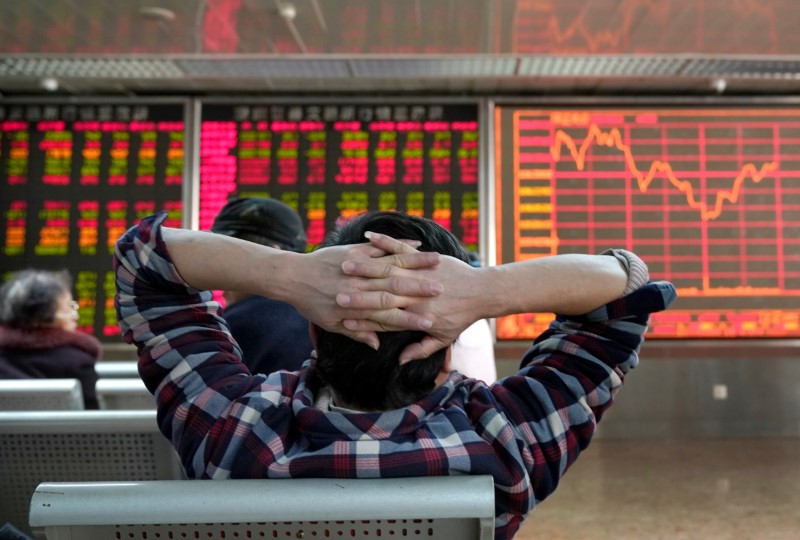This post was originally published on this site
https://i-invdn-com.akamaized.net/trkd-images/LYNXMPEG0L01S_L.jpg © Reuters. An investor looks at a stock quotation board at a brokerage office in Beijing
© Reuters. An investor looks at a stock quotation board at a brokerage office in BeijingBy Tom Westbrook
SINGAPORE (Reuters) – Asian share markets steadied on Wednesday as investors took stock of the spread of a new strain of coronavirus from China and weighed the possible consequences of a global pandemic.
Fears of contagion, particularly as millions travel for Lunar New Year festivities, knocked stocks from record levels on Tuesday as investors swapped them for safer assets.
The outbreak has revived memories of the Severe Acute Respiratory Syndrome (SARS) epidemic in 2002-03, a coronavirus outbreak that killed nearly 800 people and hurt world travel.
MSCI’s broadest index of Asia-Pacific shares outside Japan () spent the morning trading either side of flat.
Japan’s Nikkei () opened 0.1% lower, before steadying to trade flat, as did Korea’s Kospi index (). Australia’s S&P/ASX 200 () inched 0.3% higher, while the safe havens of gold and U.S. 10-year government bonds handed back some gains.
“After weeks of gains … the virus has loomed large because of the market’s positioning,” said Michael McCarthy, Chief Market Strategiest at brokerage CMC Markets in Sydney.
“The economic impact at this stage is zero. The pullback we’ve seen over the last 24 hours is the reflection of a potential threat.”
The outbreak, from its origin in Wuhan, China, has reached the United States, Thailand, South Korea, Japan and Taiwan.
Authorities have confirmed more than 300 cases of the virus in China, mostly in Wuhan, where six people have died.
The World Health Organization (WHO) meets later on Wednesday to consider whether the outbreak is an international emergency.
On Wall Street overnight, the Dow Jones Industrial Average () fell half a percent and the S&P 500 () dropped almost a third of a percentage point, following larger losses in Asia.
SARS FLASHBACK
In Hong Kong, where the SARS outbreak buffeted the economy, the main stock index () fell 2.8% on Tuesday, its biggest one-day decline in over five months. Airline, travel, hotel and casino stocks were the hardest hit, along with China’s yuan , which had its worst day since August.
“(This) virus is believed to be less serious than the SARS outbreak … but it does belong to the same class of pathogens,” Jefferies analysts wrote in a note. “The major point is whether the virus turns from an outbreak to an epidemic.”
The theme was the same in other markets. U.S. 10-year government bond yields, which fell to a two-week low on Tuesday, rebounded slightly to 1.7848% (). [US/]
was 0.1% weaker at $1,556.00 per ounce.
In currencies, the safe-haven yen eased slightly from the one-week high it touched overnight, although the yuan nursed its losses. In offshore trade, the Chinese currency barely budged from the bottom of its Tuesday plunge, last changing hands at 6.9070 per dollar .
Oil prices also settled back as traders figured a well-supplied global market would be able to absorb disruptions that have cut Libya’s crude production to a trickle. [O/R]
Brent () futures settled down 20 cents at $64.59 a barrel. U.S. crude () fell 20 cents, or 0.3%, to $58.38 per barrel.

